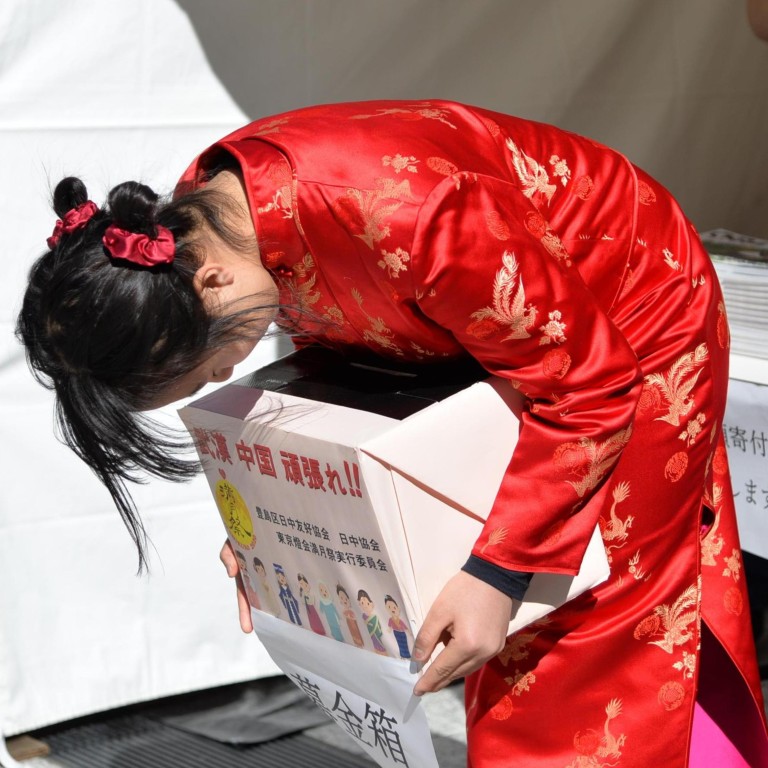
Japan’s coronavirus support wins praise in China, showing further signs of improving relations
- Reports of Japanese goodwill towards China as it struggles to contain the coronavirus outbreak have been widely shared online and in state media
- The widespread praise appears to be another sign of warming relations between the neighbours, which have a long history of uneasy bilateral ties
Japan’s support for China as it battles to contain the new coronavirus outbreak is winning it praise online and from the government in a further sign of warming relations between the two neighbours.
In stark contrast to some of the criticism Beijing has directed at the United States, Japan – a wartime occupier with which China has bitter historical disputes – has been thanked by social media users and state-run news outlets, including Xinhua, the People’s Daily and even fiery nationalist newspaper the Global Times.
Photos and video have appeared online reporting Japanese girls fundraising for Wuhan, banners bearing well wishes for China, and news that every parliamentarian from the ruling Liberal Democratic Party would donate 5,000 yen (US$45) from their monthly salary to help.
“Like most of my friends, my favourite story is that many local governments and NGOs in Japan have donated masks to Chinese, and encouraged us with many ancient Chinese poems depicting the long-lasting friendship between China and Japan,” said Qiu Ruifa, a white-collar worker from Guangzhou in southern China.
“I and many of my friends can’t help but share these ancient poems in our WeChat circle.”
Liu Huilan, who lives in Shenzhen, just over the border from Hong Kong, said she “definitely felt the goodwill” from Japan.
“It’s so easy and regular to see these kinds of articles that the Japanese government and people are taking quick and positive action to help Chinese,” said Liu, who works as an operation manager.
Japan is truly outstanding, in contrast with other news like Taiwan’s export control on masks and the US taking the lead to bar entry for most foreign nationals who had recently visited China
“I think this may be the [Chinese] government’s attempt to promote the two countres’ relations. But Japan is truly outstanding, in contrast with other news like Taiwan’s export control on masks and the US taking the lead to bar entry for most foreign nationals who had recently visited China.”
China and Japan, the world’s second and third-largest economies, have long had uneasy bilateral ties. Many Chinese believe Japan has not adequately acknowledged the extent of its brutal WWII occupation of the country, while China’s growing assertiveness, including claims to disputed islands in the East China Sea, has ratcheted up territorial tensions.
The rocky relationship, often fanned by nationalist movements in each country, is further complicated by the close trading ties between Asia’s two largest economies.
Japan and China agreed on Saturday to continue preparations for a state visit by President Xi Jinping in April, despite speculation the trip may be postponed as Beijing struggles to contain the coronavirus outbreak. The last Chinese leader to visit was president Hu Jintao in May 2008.
Beijing resident Frank Cui, who lived in Japan for years but now runs a tech consulting firm linking Chinese companies and talent with the rest of Asia, said the governments of both countries were willing to seize the opportunity to promote friendship and cooperation.
“This is actually an extension of the improvement in Sino-Japanese relations over the past two years,” Cui said. “The [good] impression of Japan has been increasing … and Japanese culture and social governance are becoming more and more popular and respected among the Chinese middle class.”
Japanese people have often encountered natural disasters, so they have strong empathy for other people suffering disasters
Once the epidemic is brought under control, Cui predicted there would be a boom in Chinese tourism, investment, trade and study in Japan.
Jenny Tao, a Chinese citizen living in Japan’s northern Hokkaido prefecture, said she had seen first hand the support for China.
“Japanese people have often encountered natural disasters, so they have strong empathy for other people suffering disasters,” she said.
Tao said China could also learn from Japan’s long history of dealing with crises: “The whole of society forms a mature and complete emergency system. In this regard, the gap between China is very far.”
Purchase the China AI Report 2020 brought to you by SCMP Research and enjoy a 20% discount (original price US$400). This 60-page all new intelligence report gives you first-hand insights and analysis into the latest industry developments and intelligence about China AI. Get exclusive access to our webinars for continuous learning, and interact with China AI executives in live Q&A. Offer valid until 31 March 2020.

